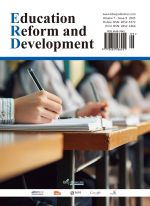Abstract
With the in-depth implementation of educational reform, college English writing teaching should also keep pace with the times, focusing on AIGC empowerment to improve the effectiveness and efficiency of talent cultivation, enabling students to comprehensively apply their professional knowledge to engage in related work after graduation. To enhance its empowering effect, it is necessary to understand its advantages in higher vocational English writing teaching, and while making full use of these advantages, explore the empowerment paths, so as to provide useful references for front-line teachers.
References
Cai W, 2023, Chinese Learning and Teaching in the ChatGPT Environment. Language Teaching and Research, 2023(4): 13–23.
Kohnke L, Moorhouse B, Zou D, 2023, ChatGPT for Language Teaching and Learning. RELC Journal, 54(2): 537–550.
Guo Q, Feng R, Hua Y, 2023, The Application and Potential Problems of ChatGPT in English Academic Writing and Teaching. Computer-Assisted Foreign Language Education, 2023(2): 18–23.
Feng Y, 2024, Constructing an Integrated Model of College English Writing Aided by AI. Journal of Jiaozuo Teachers College, 40(4): 58–60.
Wang H, 2024, Research on the Application of Generative Artificial Intelligence in College English Teaching Reform—Taking the Teaching Reform Practice of “General Academic English Writing” Course as an Example. Foreign Language Education Research Frontier, 7(4): 41–50 + 95.
Zheng Z, 2024, Research on the Application of Online Interactive Mode in College English Writing Teaching. Journal of Hubei Open Vocational College, 37(24): 176–178.
Liu Q, 2024, Research on College English Writing Teaching Based on Deep Learning in the Intelligent Era. Taste · Classic, 2024(16): 137–140.
Liu R, 2024, A Practical Study on Artificial Intelligence (AI)-Assisted College English Writing Teaching. English Teachers, 24(18): 168–170.
Wang J, 2021, The Application and Challenges of Artificial Intelligence Technology in Foreign Language Teaching. Modern Foreign Language Education, 10(2): 15–25.
Krashen S, 1980, The Input Hypothesis. In: Alatis J. Current Issues in Bilingual Education. Georgetown University Press, Washington, D.C., 144–158.
Wenger E, 1998, Communities of Practice: Learning as a Social System. Systems Thinker, 5(2): 225–246.
Liu Z, Zhang H, 2019, The Negative Effects of Artificial Intelligence on Language Learning: A Case Study of Chinese Learners. Applied Linguistics, 47(3): 551–569.
Huang X, Guo L, 2024, The Application of Large Language Models in Formative Assessment: Scoring and Feedback Based on English Writing. Education Research Monthly, 2024(7): 74–80.
Wang C, Wu D, 2024, The Application of Generative Artificial Intelligence in College English Writing Assessment and Feedback. Modern English, 2024(8): 63–65.
Tang J, Deng C, 2024, Research on the Path of Digital Empowerment for Improving College Students’ English Writing Ability Under the Background of New Liberal Arts. Journal of Mudanjiang College of Education, 2024(2): 53–56.
